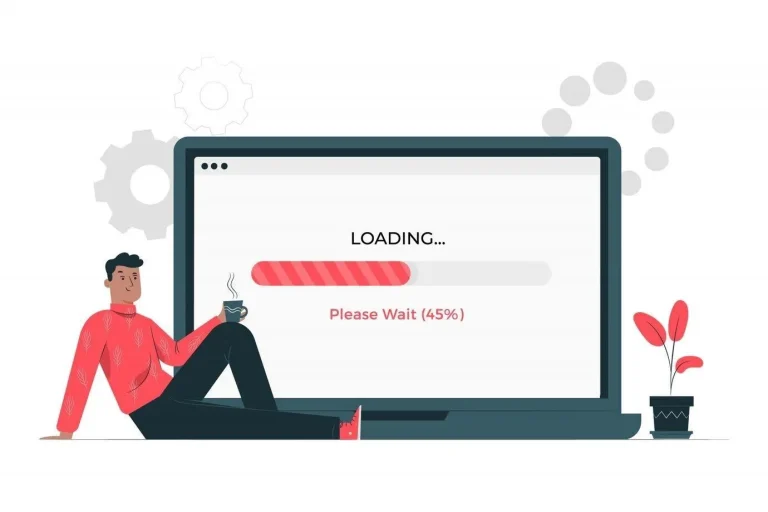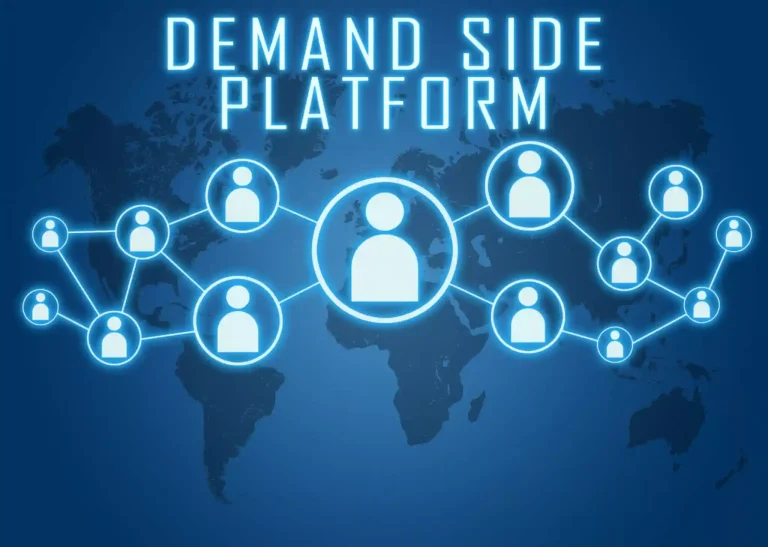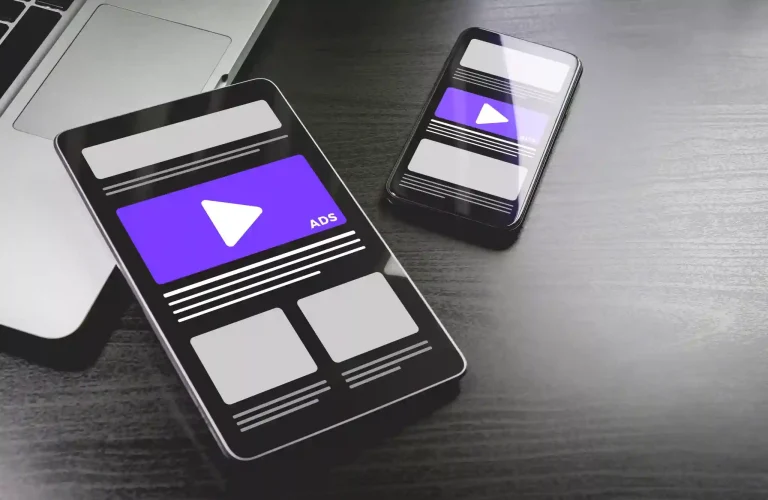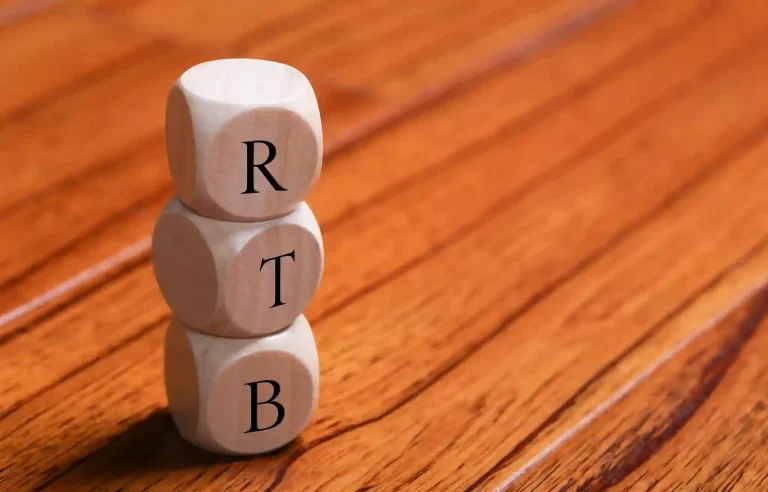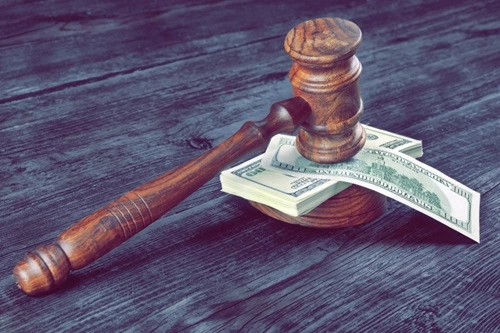Table of Contents
Why Genius?
The Genius is perhaps the most recognizable publisher known for its online annotation platform for music lovers. The website Genius.com ranks #4 position on Similarweb. But have you ever wondered how a bootstrapped startup established in 2009 outranked behemoths like Pandora, Rolling Stone, and Billboard?
We did. And there isn’t a single reason that encouraged us to select Genius for our next Becoming series. What most of the music publishers missed, Genius built. The publisher came up with a platform that transformed the static, flat lyric pages into an interactive, vibrant art experience.
In just a span of ten years, the publisher has grown its audience base from 0 to 94 Million and generates over $45.9 Million in revenue (Src). To understand how this startup remains one of the top five world’s iconic music publishers, we have to look deeper into their journey, including distinctive expansion strategies, successful and failed attempts.
How It All Started?
Launched initially as Rap Exegesis in 2009 with a prime focus on demystifying hip-hop or rap music, Genius was just a fun weekend website created by three Yale students – Tom Lehman, Ilan Zechory, and Mahbod Moghadam.
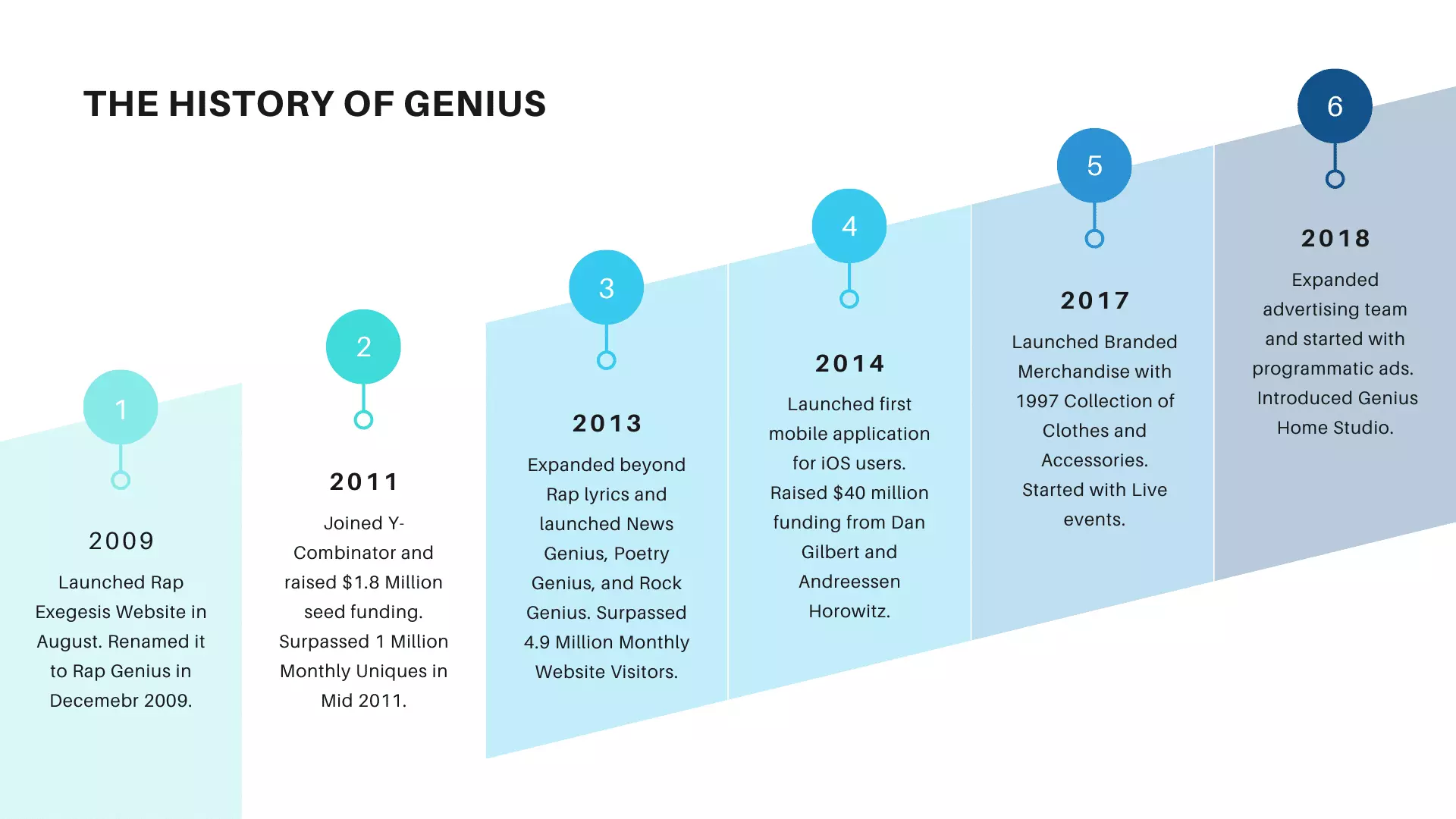
Where are they Today?
Today, from a crowdsourced blog to an annotation powerhouse, Genius has grown to serve music knowledge to over 100 million people each month on the website. More than 2 million contributors and editors are collaborating with the publisher to expand the culture beyond the rap genre. Globally ranked at 4, 85% of the Genius website’s total traffic comes from the Search engine.
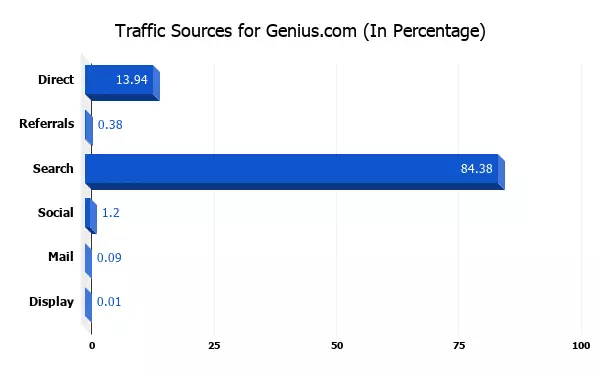
Data Source: Similarweb
So, why is the Genius so famous? How does it become such an indispensable resource for millions of audiences? Let’s take a deep dive into the journey of the publisher.
Becoming The Genius
The Beginning of a New Musical Era
From 2009 – 2011
Launch
In 2009, three classmates at Yale University – Tom Lehman, Ilan Zechory, and Mahbod Moghadam were brainstorming the lyrics of Camron ‘Family Ties’ song and asked the meaning of ‘80 holes in your shirt, there: your Jamaican clothes’. And this is how they came up with the idea ‘Rap Exegesis’, a platform for annotating song lyrics.
“Lyrics is the most popular word searched on the Web after Facebook,”
– Mahbod Moghadam (Src)
A week later, Tom Lehman, being a programmer, started coding the website to make it live on the Internet. It was 19th August 2009, when Lehman entered the first line of code at 12.30 PM, and by 6.22 PM, the first version of Rap Exegesis was finished (Src). But the website had no mechanism to add or edit the annotations, and Lehman had to add them in the application’s code by hand.

First Version of Rap Exegesis
The very first article published on Rap Exegesis was Camron’s 2004 soundtrack ‘Killa Cam’ lyrics. The first post broke down the meaning of the song when users clicked on the text on the website and looked like this:
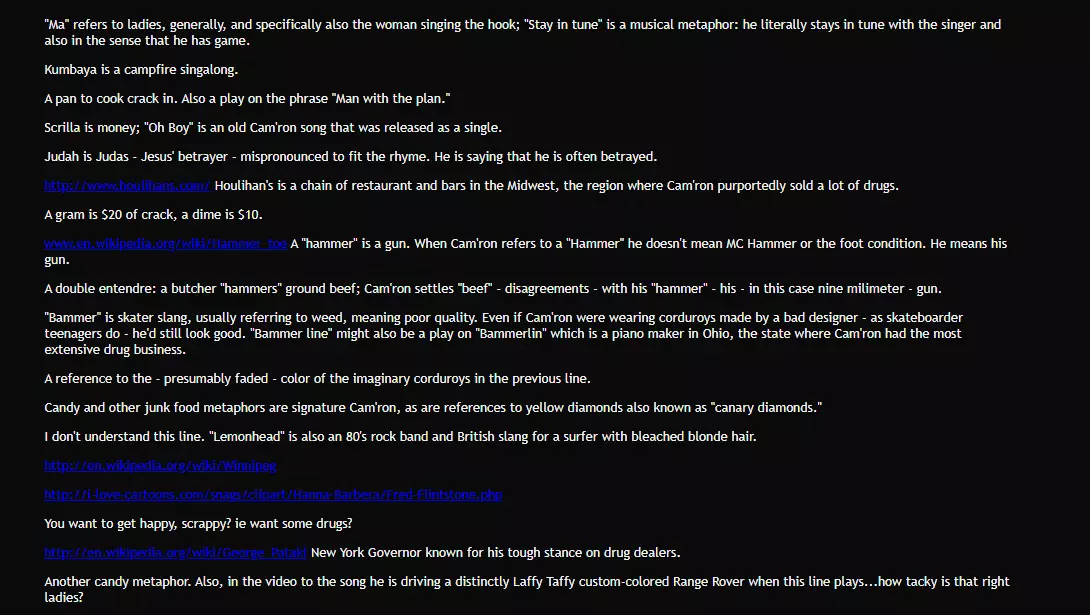
The publisher was pretty excited about the new beginnings, but the challenges were just starting. First off – the name of the blog ‘Rap Exegesis’ became the hurdle for the publisher. Because nobody could spell ‘Exegesis’, the Co-founders found it challenging to familiarize their families and friends with the brand name. How would they spread the word about their website?
As a solution, the publisher added the pronunciation of ‘Exegesis’ and redesigned the website. Now, the users were able to learn how to pronounce Exegesis by downloading the MP3 file. But do you believe it worked for the publisher?

No right? Because for a website with minimal traffic, word of mouth is the best method of marketing. And adding an MP3 on a website wasn’t supposed to be helpful. Due to the failed attempt, the publisher had to rename as ‘Rap Genius’ in December 2009.
With a simplified and memorable name, the next thing was how to produce enough content for the website to bring enough users. And while working on Genius as a side project, it was strenuous to do. So, the publisher allowed any interested artist or music lover to contribute to Rap Genius, and they could add/explain lines of verse or chorus of any song.

“Opening up the site, Wikipedia-style, came out of a desire to talk about lyrics with people smarter, funnier and more insightful than we were,”
– Tom Lehman, CEO, Genius (Src)
Contributors could upload the annotation they deemed worthwhile, and users could click on any text/word to understand the meaning of lyrics. But that doesn’t mean that the content was published without approval. The Rap Genius Community checked the submissions and commentary so that only valuable content appears on the website.
“My approach is let’s do something shitty, see how people interact with something real — something functionally and immaturely designed. Once we know we want to do something, our goal is just to get it out there.”
– Tom Lehman, CEO, Genius (Src)
By the mid of 2010, the website rapgenius.com started gaining serious traction from the public. As they searched for the song lyrics on Google, they started arriving at Rap Genius’ website.
Mapping Out Lyrics
If there are publishers who have explored interesting concepts to engage their audience, then Genius is one of them. Soon after the launch, the trio introduced The Rap Map, a Google-map lookalike (app) mashup that plotted the origin and references of various places in rap lyrics.

Like Google maps that guide people by using data from check-ins, Twitter trends, etc., the publisher used its lyrics from rap songs and placed markers on the map with the lyrics and explanations of why that location is relevant for a music lover.
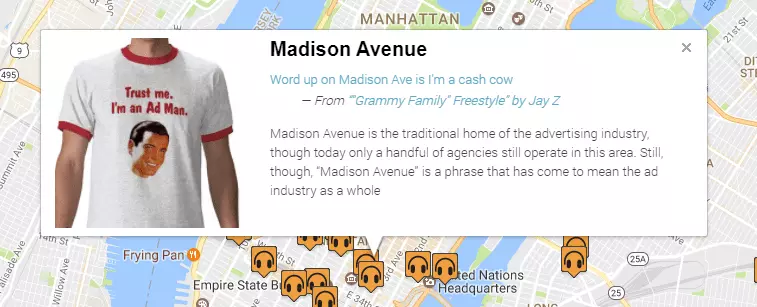
“Rap Map is like a guided international tour through the history of hip-hop.”
– Genius (Src)
Don’t you think it was an interesting strategy for engaging the readers? It was one of the examples set by the publisher of how you can creatively use web apps.
First Round of Funding
There is no shortcut for significant, easy, and fast revenue for any business. And to build ideas and make the visions a reality, startups need capital. The same scenario applied to Rap Genius. Though the trio had many product ideas, there weren’t enough resources to get to the next level.
But due to the uniqueness of the website and the way it was attracting musicians from around the world, getting the first round of funding was favorable. So, they prepared a pitch deck and reached out to Y-Combinator, a startup accelerator.
After hours of discussion and negotiation, the investors agreed to help the publisher raise the fund and diversify the areas of choices. And guess what? The Genius became the ‘fastest-growing websites in Y-Combinator’s history’ in a year .
“How do we turn this thing into a cultural phenomena — as the go-to place when you’re looking up a song? We want to be the center for songs.”
– Ilan Zechory, Co-founder, Genius
With the help of a $1.8 million fund, the publisher bought offices in Brooklyn and made small adjustments to the way content was published on the website. By the end of 2011, Rap Genius became a community of 40,000 users and had over 250,000 song lyrics (Src). The monthly traffic was 3 million (Src) and around 450 editors with 1,00,000 contributors were working at Genius in 2011 (Src).
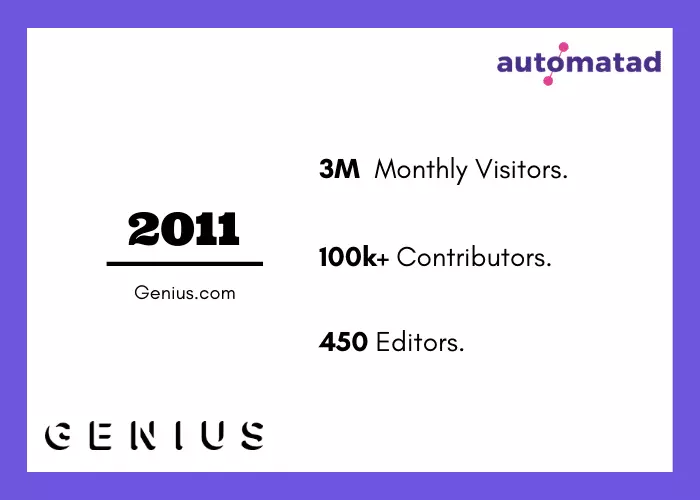
Paid Partnership
After raising funds from the investors, the ambition of publishers was no longer limited to ‘annotating the rap lyrics’. Besides, the website had already begun to attract millions of visitors every month. The publisher approached Nas, an American rapper to discuss the collaboration probabilities. While the rapper agreed on collaborating with Genius, the financial agreement wasn’t disclosed anywhere.
In a matter of time, various famous rappers including ASAP Rocky and RZA joined the publisher and started explaining any line or chorus of their songs on Genius.com. Not only did the verified rappers promote their upcoming albums, some of them even released the lyrics before even putting out the song itself.
“There is a key difference between us and Wikipedia. Wikipedia won’t allow Barack Obama, for example, to contribute to his own page. But there might be something that only he knows that could contribute to the public understanding of who Obama is.”
– Tom Lehman, Co-founder, Genius (Src)
Let’s Create the “Internet Talmud”
From 2012 – 2014
Is there any publisher who never got into a business feud? Well, there may be some but not many. And Genius is one such publisher. You can say this was the first dispute the publisher had to face. In 2013, the website rapgenius.com was one of the 50 websites that got a notice from the National Music Publishers Association (NMPA) for the unlicensed publication of song lyrics ).
This was supposed to happen. Because there were 5 million searches for ‘lyrics’ on Google and more than 50% of all lyric page views were on unlicensed lyric websites that promoted advertising to generate ad revenue (Src).
But, unlike other targeted websites, Genius was an ad-free website browsed by millions of real users. The goal was never to be on the most undesirable list of websites that use lyrics without permission. It had tens of thousands of verified annotations directly from the musicians and writers.
Though the publisher came out of trouble, somehow, it learned a lesson that resulted in getting started with content licensing.
Content Licensing
No more rap feuds. This is what Genius learned from its past dispute with NMPA. So, what’s next? Get a little more legit. For that, the publisher signed the first licensing agreement with Sony/ATV Music Publishing.
“This partnership has already been magical for both sides, and the symbiotic relationship between Rap Genius and artists will only grow stronger as more publishers board the ‘Rap Genius Love Train.”
– Genius (Src)
Since then, the publisher has stayed on the legal side and went into several contracts to grant usage rights for musicians’ intellectual properties. After that, various top singers such as Eminem, Selena Gomez, and Miranda have created their accounts on Genius.com and annotated their lyrics.

Image Source: Genius
Launch of Enterprise Genius
If you’re wondering what Enterprise Genius is, then here’s the answer – an annotation platform that enabled famous musicians to create premium accounts for music annotations. With millions of website visitors, the publisher could have placed ads on the website.
Instead, it took a different approach and launched Biz Genius (a.k.a Enterprise Genius) to strike monetary agreements with the rappers worldwide. Using Enterprise Genius, the verified rappers could upload the lyrics with images and people were able to discuss the lyrics, vote up and down annotations and more.
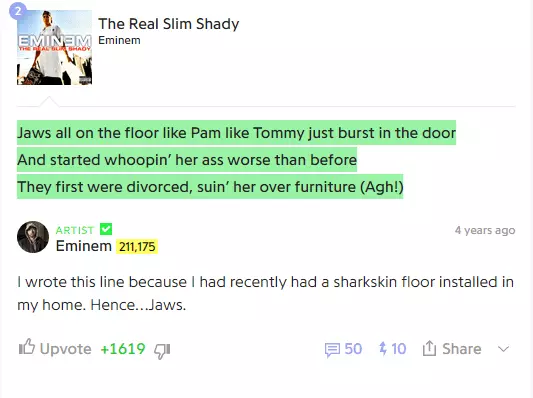
“By combining advertising and eventually premium accounts on its free sites with paid licenses to an enterprise version, Rap Genius might be able to generate serious revenue.”
– Tech Crunch (Src)
The website traffic was at 4.9 million monthly visitors in 2013 and 25 employees were working at Genius ).
First Native Genius App
In 2014, the mobile app ecosystem was evolving globally. There were billions of users and spending more than 2 hours 42 minutes per day on mobile devices.
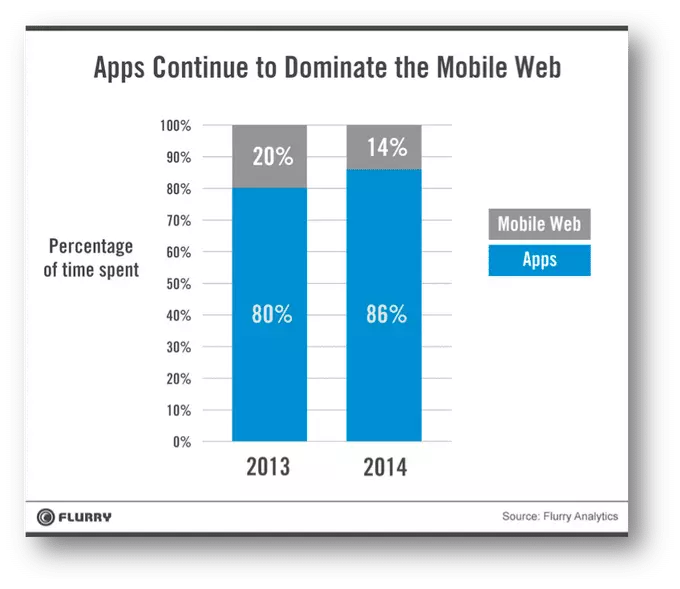
Image Source: Tech Crunch
While many publishers who continued to focus on the web, the publisher understood the importance of app presence because more than half of the traffic was already mobile (Src).
At the beginning of 2014, the publisher launched the first app, ‘Genius’, for iPhone users. Now, the users could check out the full annotations for poetry, rap, news, search by authors and titles, skim the historical documents, and more.

During the initial days, the mobile app of Genius couldn’t support Spotify or any other on-demand streaming service. But the publisher made sure that the users leverage YouTube. For this purpose, the users were provided with YouTube and SoundCloud embedded links that allowed them to listen to third-party music.
“Thousands of years from now, the mobile app is how people will remember Rap Genius.”
– Tom Lehman, Co-founder, Genius (Src)
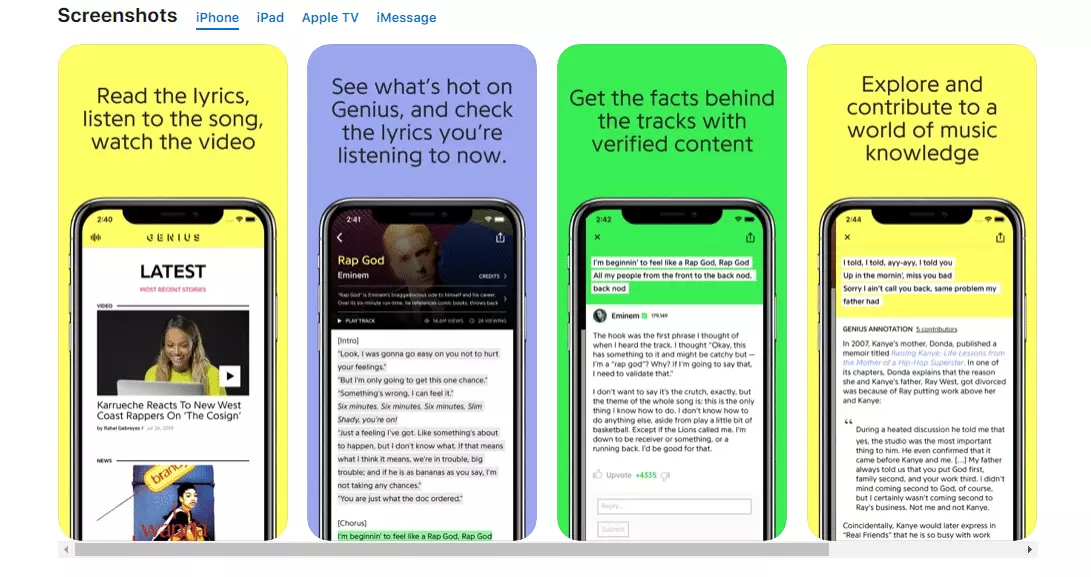
Get The Ball Rolling
From 2015 – 2017
Bringing Genius On Spotify
By the end of 2015, top competitors of Genius including Metrolyrics or Musixmatch and AZlyrics had already integrated the website with Spotify. To rise above the competition on SERP for song lyrics and drive the traffic to Genius, the publisher needed to offer something better than anyone else.
So, the publisher teamed up with Spotify to provide backstory and commentary of streaming tracks that popped up on the users’ playlist. With the partnership, Genius introduced a free hip hop playlist Behind the Lyrics (Hip Hop) and Behind the Lyrics (Hits). When users clicked on one of the songs, the lyrics would be displayed and text highlighted in yellow would provide more information about the song and lyrics, just like how Genius worked on the website.

At that time, the Spotify app had over 75 million users and didn’t want to be known as just a music listening provider (Src). On the other hand, the publisher found it as a way to extend the audience base and attract the right users toward the brand.
Getting ahead with videos
If you’ve been in the publishing industry for a while, you must have felt the impact of digital video. The rising tide of digital video was visible to the publisher. That’s why we believe the publisher decided to enter into the video by the end of 2016.
However, producing and distributing video content on the website and other platforms required human resources, resources, and intense time commitments. So, the publisher started slowly. At first, the publisher unveiled a weekly video series ‘Verified’ with three episodes and featured artists – Mac Miller, Zara Larsson, and 21 Savage.
The expansion of the video teams showed the success of a video strategy. Within a year, the publisher had a group of 17 people dedicated to just video production and announced that videos were the top priority for Genius,
“We’re building video franchises; we have not been in the business of creating a bunch of random videos that catch on and get a ton of views,”
– Ben Cross, Chief Strategy Officer, Genius (Src)
Turn Towards Branded Merchandise
Although paid partnerships remained at the heart of the publisher’s revenue model, the need for diversification of revenue was crucial with the growing audience. As a result, the publisher took a turn towards brand merchandise in 2017.
What was so unique about this? Aren’t all publishers leveraging eCommerce as a revenue stream? The concept was all the same. But the collection was different. It launched with a 1997 collection in 2017.
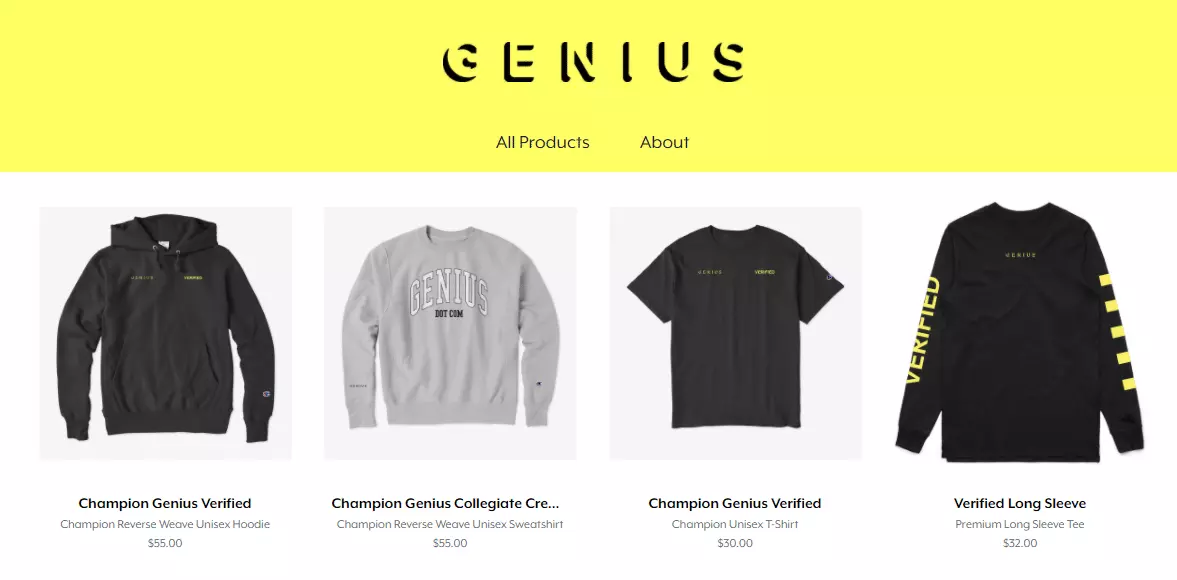
“What was interesting about 1997 is that there was sort of a collision between this big, blockbuster commercialism and a more gritty authenticity.”
– Brendan Frederick, Chief Content Officer, Genius (Src)
The products would sell on the Genius Shop with fair prices from $8 for a golf ball to $70 for a beach towel. The publisher ensured that the products were meant for its ideal audience, i.e., music lovers, and gave a touch of everything from Titanic to Notorious B.I.G music.

“We wanted to create clothing that would tell a story and connect with our overall mission. This gives us a chance to do things in a more permanent way.”
– Lila Murphy, Creative Lead, Genius.
Visionary Live Events Strategies
Diversification of revenue for publishers was not limited to eCommerce by the end of 2017. With the evolving technologies and the Internet, plenty of smart channels were getting explored by legacy publishers. And one of such lucrative channels was live events.
Since the Genius had already developed more profound connections with its audience and had strong brand recognition, the publisher tapped into live events in the same year. The publisher hosted the first live event in Brooklyn after coming into a partnership with Wale, a rapper, to bring the audience together.
Though there is no evidence of how much success the publisher attained with the first live event, it gave the publisher enough confidence to host several other live events since then. The revenue was $10 Million (Src) and around 80 employees were working at Genius in 2017 (Src).
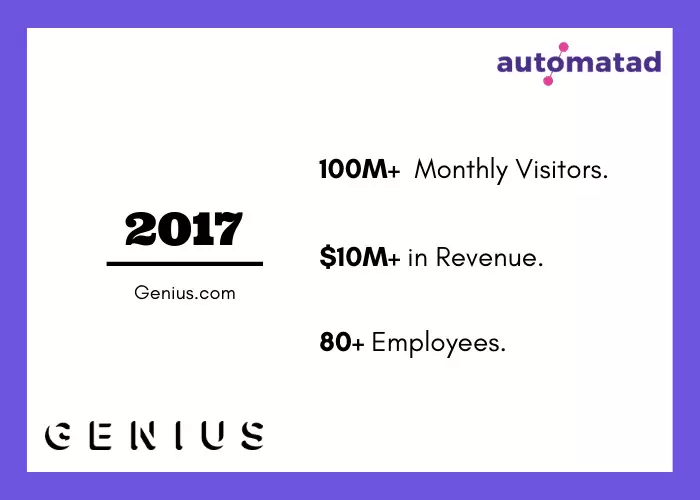
A Rising Unicorn
From 2018 – Till Present
Building own stories
In 2018, Instagram reached over 1 billion users on its social app (Src). And that has encouraged several media organizations to include it in their content distribution channel. For example, New York Magazine, Pop Sugar, and Food52.
The interactive form of storytelling of Instagram stories is rarely new for you or anyone else. In general, publishers use stories to drive website traffic or ad revenue. But as we said earlier, Genius has always been creative with its strategies. Rather than creating stories on Instagram, the publisher understood how stories functioned on the social media app and built its own Instagram-like stories, Song Stories.

The Song Stories combined the artist interviews with YouTube’s content (music video clips, concert footage, playlists, and more). Via these Song Stories, when the users moved from one story to the next, they could see behind the scenes and interact.
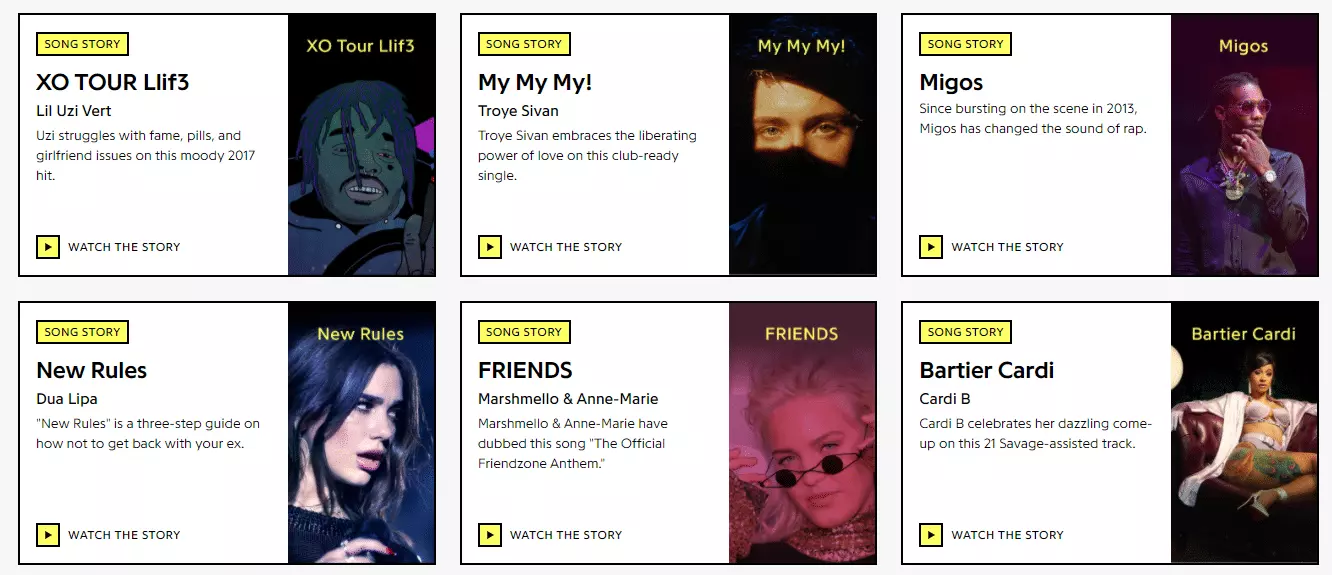
Just like Instagram stories, users could pause the story or watch the next story and go to YouTube directly by clicking on the added links. However, the Song Stories were added on the Genius’ website and within the Android and iOS mobile applications.

“Genius and YouTube, the two biggest sources of musical deep cuts and rabbit holes on the planet, are natural collaborators on this mission,”
– Ilan Zechory, Co-founder, Genius
By adding YouTube to its content strategy, the publisher started gaining 150,000 subscribers every month and reached 2.6 million subscribers.
Getting Started with Programmatic Advertising
Every major publisher has tried various kinds of advertising in recent years. Some made their debut in the late 90s, while others entered into the advertising realm after a decade. Genius, being late, started with digital advertising by the end of 2018. Let’s learn how the publisher is transforming the revenue model with ads.
As a beginner in the advertising field, the publisher initiated programmatic direct deals with some top advertisers. But shortly after adding ads on the website, the publisher shifted to header bidding and partnered with Rubicon Project, OpenX, TripleLift, etc.
In addition to the significant SSPs, the publisher has also integrated AdSense to monetize the remnant ad inventories. Further, to maximize the ad revenue, the publisher runs Google’s Open Bidding and Amazon’ Server-side Header Bidding. Moreover, the publisher has integrated data management platforms to leverage first-party audience data and serve better-personalized ads.
“Advertising, sponsorship, content licensing, product partnerships, events, and commerce — you have to do everything. Ads are most of it, the bulk of our money.”
– Ilan Zechory (Src)
Mobile In-app Monetization
As the users shifted towards mobile, the publisher found out that the monetization opportunities for mobile apps are enormous. As the programmatic offers an efficient way of monetizing the in-app traffic, the publisher started with header bidding. But to run auctions in the mobile app, the publisher needed a mediation platform to integrate the SSPs and ad exchanges. So, the publisher partnered with AdMob, Google’s mediation platform.
In general, the banner ad is the most common format by the publisher in the in-app environment. The ads load as soon as the Genius app is opened and naturally, buyers pay big bucks for such highly viewable ads. Moreover, the publisher has integrated data management platforms to leverage first-party audience data and serve better-personalized ads.
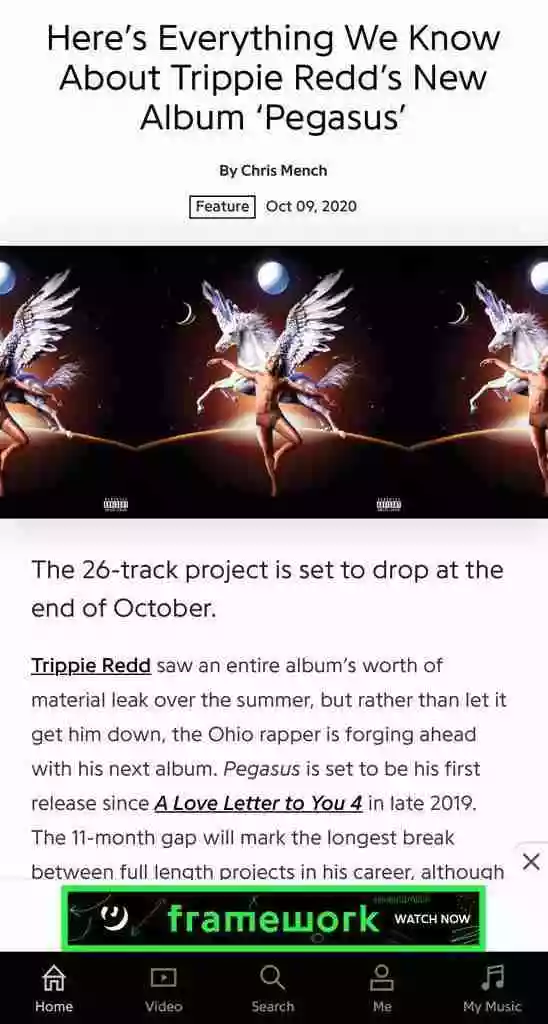
Conclusion
Acquiring 100 million monthly visitors in 10 years isn’t easy, and many publishers aspire to get to the point where Genius is today. Though we’ve highlighted some of the important growth strategies throughout the case study, the publisher has done a lot that isn’t known to the public.
Long story short, the more you educate your audience, the more your audience feels catered to, the more they are likely to convert. By any means, affiliate marketing, advertising, or content licensing. What did you like about Genius? Let us know in the comments section.




